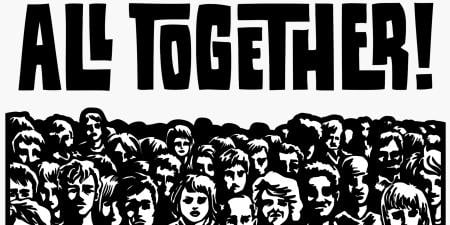The 1960s were a transformative decade in the history of the United States: the civil rights movement, opposition to the war in Vietnam, environmentalism, and a host of other causes inspired an entire generation of citizens to become more active in shaping the world around them. At the same time, the government was expanding tremendously with the establishment of programs such as Medicare and Medicaid to help provide health care to America’s elderly and poor.
Physicians were looking closely at these historic events and noting that the medical community had yet to come to terms with this new world of activism [1]. Among them were five medical school professors, who, after gathering at a national meeting in the late 1960s and noting the detached and passive model of medical practice promulgated in medical education at the time, proposed a pilot program called the Clinical Scholars Program (CSP) to train physicians to become agents of change, not only in the clinic and in the hospital, but also in communities, in classrooms, and in the halls of power [2].
For the first three years of its existence (1969-1972), the program was based at five universities and funded jointly by the Carnegie Corporation and the Commonwealth Fund. In 1972, it found a new home in the Robert Wood Johnson Foundation (RWJF), an organization whose recent philanthropic focus on hospitals and medical care coincided with the CSP’s aims of improving the quality of American health care [3, 4].
While the leadership, participating institutions, and specific structure of the program have changed over the past four decades, the objectives have remained largely the same: to provide nonbiological training to physicians in a variety of specialties to expand access to health services, improve quality of care, and develop a base of evidence to inform national health care policy [3]. After training 1,200 scholars over the past 45 years, the Robert Wood Johnson Clinical Scholars Program is accepting its final cohort in 2014 [5]. It leaves behind a legacy of inspiring two generations of physicians to venture beyond the clinic and the hospital to be agents of change for the health care of all Americans.
Clinical Scholars Program Curriculum
Admission to the Robert Wood Johnson Clinical Scholars Program has been selective. In 2013, 24 scholars were selected out of a pool of 70 total applicants [6]. Approximately a quarter of applicants had completed prior graduate work in public health, and many others had been active in organizations like the American Medical Student Association and the American Medical Association (telephone interview with Desmond Runyan, MD, November 22, 2013). And, while in earlier decades the majority of clinical scholars were trained in internal medicine, family medicine, or pediatrics, the program has more recently attracted trainees from a broader scope of fields [6].
Currently, the program has four training sites, at Yale University, the University of Pennsylvania, the University of Michigan, and the University of California Los Angeles, with the national program’s offices based at the University of North Carolina. Additional support is provided by the US Department of Veterans Affairs, which has collaborated with the RWJF since 1978 to fund the stipends for positions in each cohort and to provide both clinical and research resources as well as mentorship at affiliated Veterans Affairs medical centers. More recently, the training universities have contributed to funding positions for the program [8]. Altogether, the investment in each scholar has been upwards of $500,000 [9].
While variability exists among the four programs, all involve two years of training, after which a master’s degree is awarded. The first year consists largely of graduate-level coursework in subjects such as health policy, health economics, epidemiology, history, and statistics to enable scholars to better understand the context of the health care system and to introduce them to research methods in health services research. Scholars can also elect to take a variety of other courses [10].
It is also during the first year that the scholars begin to work on their research and policy projects. While community engagement has been one of the cornerstones of the program from the time of its inception, since 2005 there has been an added focus on community-based participatory research (CBPR) [8]. In such projects, scholars collaborate closely with community-based partners, from the conception of the idea to drafting the research protocol, executing the plan, and disseminating results [11]. Each scholar is expected to learn CBPR skills, and some scholars’ final projects involve CBPR [7, 10, 12].
The Clinical Scholars Program also emphasizes leadership development throughout the two years of training. Leadership training sessions, visits to government sites, and invited presentations on leadership are integrated into the curriculum. About one-third of scholars participate in extended policy electives, ranging from two weeks to three months at a time, with local, state, or federal agencies and health care organizations, to bridge community work with a practical understanding of policymaking. Scholars are expected to spend 10-20 percent of their time on clinical activities throughout their training in order to maintain their clinical skills [8].
The Program’s Legacy
Many of the Clinical Scholars Program’s 1,200 alumni have become leaders in health care policy and delivery. Graduates have assumed leadership roles in government at all levels, contributed to the growth of academic internal medicine and pediatrics, among other fields, and engaged communities as physician-leaders to resolve problems in delivering health care using approaches like CBPR [8, 10]. Some, like Drs. Ed Ehlinger, David Gifford, and Nirav Shah, have gone on to become state health commissioners; others, like Drs. William Applegate, Linda Rosenstock, and David Nash, are now university deans.
As one of the first major postresidency training program to emphasize nonbiological research, [13] the CSP has had an important role in shaping other clinical research and health services research training programs. As elaborated by Robert Dittus, MD, alumnus of the CSP class of 1984 and the director of the Institute for Medicine and Public Health at Vanderbilt University, many of the health services research training programs can trace their genesis to alumni of the RWJ program (telephone interview with Robert Dittus, MD, November 25, 2013). Additionally, many of the early leaders in the field of emergency medicine, who helped it become recognized as a specialty, were CSP alumni [14].
Alumni of the Robert Wood Johnson Clinical Scholars Program have also been active in government, and many prominent members of the Centers for Medicare and Medicaid Services, the Department of Veterans Affairs, and the Department of Health and Human Services have trained in the program [10]. CSP alumni, among other physicians, brought about the passage of the Children’s Health Insurance Program Reauthorization Act of 2009, which mandated the creation of the Pediatric Quality Measures Program to maintain high levels of quality in pediatric care. Five of the seven national centers of excellence established by that piece of legislation are currently headed by CSP alumni [2].
Perhaps just as importantly, the CSP has helped to inculcate a sense of activism among scholars and alumni. Stacey Lindau, MD, an alumna of the CSP class of 2002 at the University of Chicago and a member of the National Advisory Council of the program, relates how the CSP’s “traditions of promoting excellence, critical thinking, and service extends beyond the two to three years of training, effectively creating a pipeline of alumni dedicated to service”(telephone interview with Stacey Lindau, MD, December 3, 2013). In 2009, at the annual meeting of the National Advisory Council, Dr. Lindau, along with other alumni, noted how physicians were largely uninvolved in the process of drafting legislation on improving health care access and quality. She encouraged fellow physicians to convene in Washington, where they met with leaders of Congress to increase awareness of health care disparities and to advocate on behalf of the uninsured and others without ready access to health care (telephone interview with Stacey Lindau, MD, December 3, 2013).
Conclusion
For over four and a half decades, the Robert Wood Johnson Clinical Scholars Program has challenged the assertion that physicians have little role to play in shaping their communities outside of the clinic and the hospital. It has pursued its aims of training talented physicians to become leaders of change in the clinic, the classroom, and the community at large with great success.
References
- Shuster AL, Cluff LE, Haynes MA, Hook EW, Rogers DE. An innovation in physician training: the Clinical Scholars Program. J Med Educ. 1983;58(2):101-111.
-
Isaacs SL, Knickman J. The health care workforce. In: Isaacs SL. Knickman J, eds. To Improve Health and Health Care. San Francisco: Jossey-Bass; 2004:111-117. The Robert Wood Johnson Foundation Anthology, vol 7.
- Feinstein AR, Beck JC. The Robert Wood Johnson Clinical Scholars Program. N Engl J Med. 1975;293(22):1149-1150.
- Kleinman LC, Runyan DK. Moving the discourse on quality in pediatrics: recent contributions of Robert Wood Johnson Foundation clinical scholars. Pediatrics. 2013;131(Suppl 1):S1-4.
-
RWJ will replace the Clinical Scholars and other existing programs with programs that expand the numbers of leaders and scholars they support and that include interdisciplinary and team-based approaches. Robert Wood Johnson Foundation. A bold new direction for leadership programs. http://www.rwjf.org/en/about-rwjf/newsroom/features-and-articles/A-Bold-New-Direction-for-Leadership-Programs.html. Accessed August 1, 2014.
-
Physician leaders selected as Robert Wood Johnson Foundation clinical scholars [news release]. Princeton, NJ: Robert Wood Johnson Foundation; July 9, 2013. http://rwjcsp.unc.edu/pressreleases/2014-16_CSP_New_Scholars.pdf. Accessed July 31, 2014.
-
Yale Center for Clinical Investigation. Yale Robert Wood Johnson Clinical Scholars Program. http://www.ycci.yale.edu/community/education/rwj.aspx. Accessed August 1, 2014.
-
Robert Wood Johnson Foundation. Robert Wood Johnson Foundation clinical scholars. http://www.rwjf.org/content/dam/farm/reports/program_results_reports/2013/rwjf70030. Accessed August 1, 2014.
- Voelker R. Robert Wood Johnson Clinical Scholars mark 35 years of health services research. JAMA. 2007;297(23):2571-2573.
-
Robert Wood Johnson Foundation Clinical Scholars Program. Who we are. http://rwjcsp.unc.edu/about/. Accessed August 1, 2014.
- Tapp H, White L, Steuerwald M, Dulin M. Use of community-based participatory research in primary care to improve health care outcomes and disparities in care. J Comp Eff Res. 2013;2(4):405-419.
-
University of Pennsylvania. Robert Wood Johnson Clinical Scholars Program: research. University of Pennsylvania. http://www.med.upenn.edu/rwjcsp/research.shtml. Accessed August 1, 2014.
- Teo AR. The development of clinical research training: past history and current trends in the United States. Acad Med. 2009;84(4):433-438.
- Landman A, Meisel ZF. The Robert Wood Johnson Foundation Clinical Scholars Program and emergency medicine. Acad Emerg Med. 2010;17(4):e17-e22.



